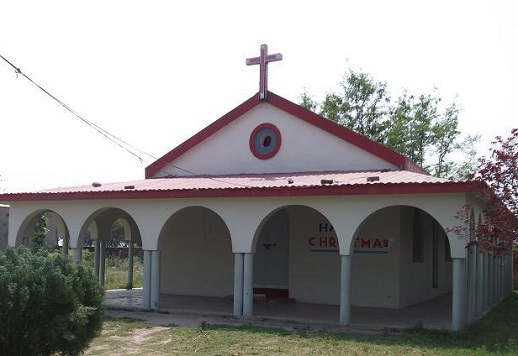
More than 200 men, some armed with sticks, suddenly gathered on Wednesday morning (8 Feb) beside the Alba Presbyterian Church in Sankhatra, 115km north of Lahore, intent on building a boundary wall.
“Children were going to school and men were leaving for work when this large number stormed into the area and started construction,” said Asher Moon, 38, the church’s pastor. “Some of our men and women tried to intervene but they were called names and men armed with sticks beat them.”
Sankhatra is part of Narowal District, where Presbyterian missionaries from the US city of Philadelphia journeyed in 1855 to begin a mission that would spread the message of Christianity across Punjab, which had only come under British rule in 1849.
Thirty Christian families still live in Sankhatra, but their land has been under legal threat.
Moon, who took over the leadership of the church when his father died in 2011, said the police were “reluctant to register a case” against the attackers, although five women and a 13-year-old boy were among those hurt.
“For [the police], our being insulted has no meaning,” he said.
“We called the emergency response police three times, but they only arrived after two hours, after the crowd had beaten and insulted our men and women. The construction work was still going on and we showed them a magistrate’s injunction that no party can change the current status until the ownership of the land is decided in the court, but the police refused to acknowledge this court order.”
The legal battle has been raging for ownership of the 1750-square-yard piece of land since April 2016.
“It was even worse at that time,” said Moon. “They brought bulldozers and fired shots in the air and beat our men and women. They even demolished some of our houses.”
Moon said they had “rushed to court” to obtain an injunction against their eviction. They received it and the court case is ongoing.
But Moon said that last week “false propaganda” was spread that the court had ended the temporary injunction, leading the men to think they could return to demolish more buildings.
“Most of our people are illiterate and work menial jobs, so [the locals] had thought that it would be easy to fool them,” he said. But Moon had the injunction renewed at court on 6 February.
Chaudhry Kashir, a local Christian councillor, told World Watch Monitor that the attackers want to set up a market of between 50 to 100 shops on the land, which is beside a main road.
“The other party has documents that show that someone gave this [government-owned] land to the Christians for living about seven decades ago but there is no valid proof that is provided in the court yet,” he said. “Mostly, civil litigation on land issues goes on for 20 to 30 years in Pakistan. So parties indulge in criminally evicting the weaker side to show to the court that they are in possession of the land to strengthen their case.”
A local police officer, Ishtiaq Ahmed, said he didn’t know if the land had ever been owned by the government, but that the Christians were “lying” in saying that “this is their land, or that they have any connection with it”.
“The other party had legal documents,” he added.
Ahmed also claimed that no violence had taken place on Wednesday morning – only a “verbal clash”.
“If their women had been beaten, then the police would have registered a case,” he said. “There are no houses on the land and I don’t know if there were houses 10 months ago that were demolished.”
But Moon said there have been Christian homes on the land “since my childhood”.
“I was told that there used to be a pond for sanitary water but when the sewerage system was set up, this pond dried up and Christians filled it in with earth and built their homes,” he said. “Now this land has commercial value and they are trying to snatch it from us. Our opponents have encroached on the church land too: up to five feet on one side of the church, and 15 feet on the other side.
“The same police who were unwilling to register a case, and then were unwilling to accept the court injunction, are now having to acknowledge the court injunction because of pressure from higher authorities.”
Several attacks on Pakistan’s Christian minority have been linked to land disputes and it is thought this has also been the motive in several accusations of blasphemy against Christians. Incidents include the 2009 Gojra communal violence in which seven Christians died; the blasphemy accusation against 16-year-old Rimsha Masih in 2012 and the Joseph Colony arson attack in Lahore in March 2013.
As World Watch Monitor reported last year, Christians were also threatened with eviction from government land in Islamabad, the capital, because their “ugly” settlements spoil the landscape of “one of the most beautiful cities in the world”.
It used to be prohibited for members of the so-called “untouchable” castes – which includes many Christians – to buy land. Even today, most Christians live in irregular or illegal settlements on government land.
Background
Narowal is significant for the Pakistani Christian population because it’s the district where Christianity first started to spread through Presbyterian missionary Andrew Gordon in 1855.
In 1873 there were only about 4,000 Christians in Punjab, from diverse metropolitan backgrounds.
Then, 10 miles from Narowal, in 1873 an “untouchable” man known as “Ditt” (who had to skin dead animals and pick up garbage from the streets to survive) converted to Christianity. Ditt spread the Gospel among his caste in surrounding villages as US and European missionaries spread education and healthcare. From 1881, the number of Christians in Punjab multiplied from just a few thousand to over half a million by 1941.